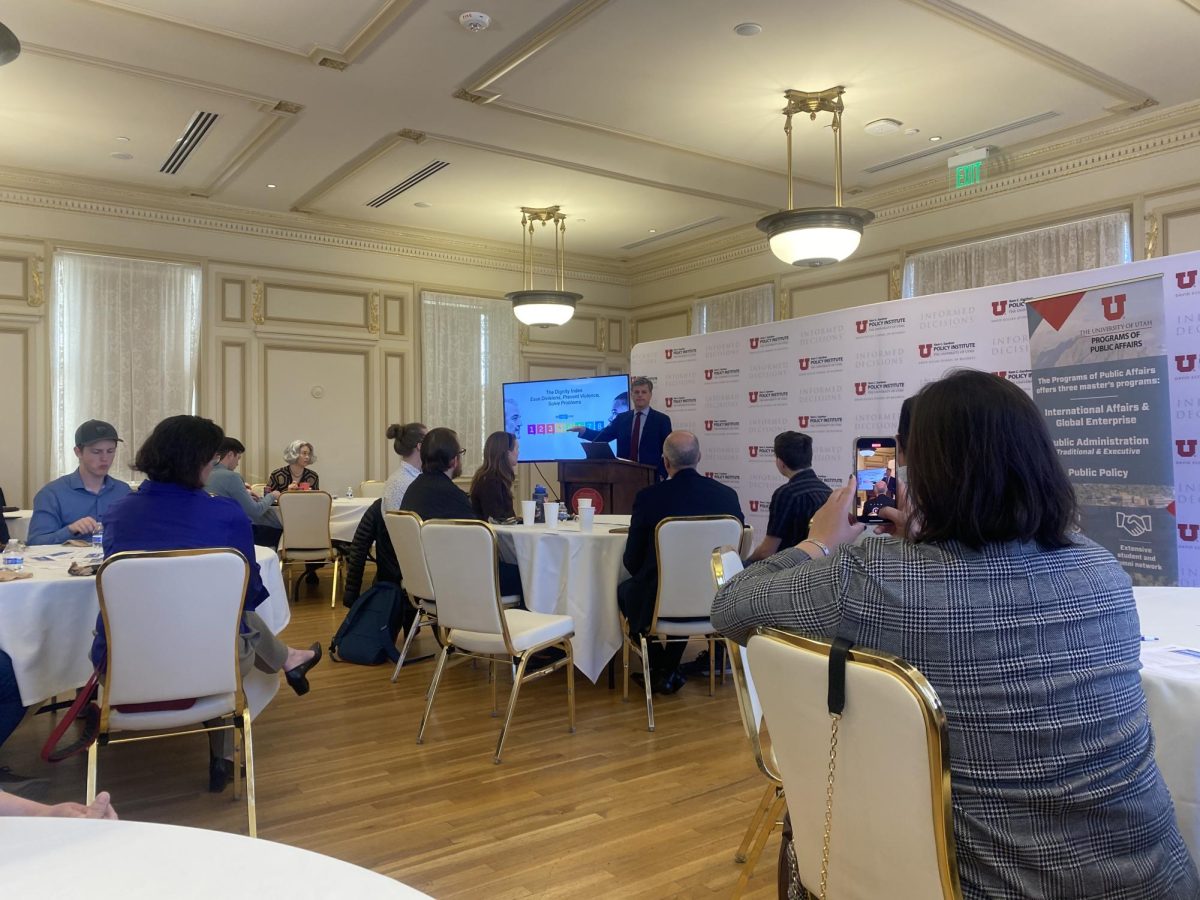
// Brent Uberty
Laurie Goodstein, national religion correspondent for the New York Times, finally made it to Salt Lake City. Her first trip was postponed because of the papal resignation in February.
Before delving into her discussion of religion, Goodstein shared estimates of what the actual picture of religion looks like in the United States.
She said about 30 percent of Americans identify as evangelical Protestants, close to 24 percent identify as Catholic and nearly 20 percent do not identify with any religion. Around 15 percent identify themselves as mainline Protestant, a grouping that includes Lutherans, Presbyterians and Episcopalians. Nearly eight percent identify as black Protestant. Less than two percent of people identify themselves as members of The Church of Jesus Christ of Latter-day Saints, and two percent identify themselves as Jewish. Combined, less than two percent of Americans identify as Muslim, Buddhist or Hindu.
Goodstein chalks up this religious diversity to the First Amendment.
“America has a religiously vibrant market place, almost like no other on Earth that I can think of,” she said.
Aside from highlighting America’s religious diversity, Goodstein focused on persecution and prejudice of religious minorities, including the opposition Mormons faced in Oklahoma and Missouri during the mid 1800s.
She believes Romney’s 2012 presidential race “was a clearest gauge of how far we as a country and the LDS church have come … prominent people stood up against ignorance and bigotry against Mormons.”
She said American Muslims have dealt with the brunt of religious strife and persecution since the 9/11 attacks.
“The Muslim story seemed to change overnight — suddenly it seemed that every Muslim in America was a suspect or at least felt that they could be. The faith itself became suspect,” Goodstein said.
Goodstein discussed the violent revenge attacks that followed in the days after 9/11. However, with the bad came the good. She shared anecdotes about people of different faiths reaching out to Muslims. Christians, Jews and others offered protection to Muslim women in the days after the attack. Another story involved a Christian woman who called a local mosque after the 9/11 attacks to ask if she could speak to a Muslim woman. The two became friends and started an interfaith organization for women. The group has ballooned since then and has started working on community service projects.
Goodstein pointed out that Muslims have reached out to their own communities after being attacked by extremists. After the bombing at the Boston Marathon, Muslims reached out to their hurt community by sponsoring blood drives and handing out red roses.
She also shared the story of Rose Hamid, a U.S. Airways flight attendant who became more religious after a serious illness and decided to wear a hijab. U.S. Airways refused to allow her to wear one while working. Goodstein covered Hamid’s story in 1997 and years later, in 2004, U.S. Airways reversed its decision and asked Hamid to help design an appropriate hijab that complemented the flight attendant uniform.
“The measure of our decency can be gauged by how we treat religious minorities,” Goldstein said.
Many students enjoyed her presentation and took away different aspects of her discussion.
“I really enjoyed it … she’s a brilliant lady whose opinion I definitely respect. I liked the part about interfaith organizations, that was the part that stuck out to me the most,” said Hunter Rodriguez, a student in religious studies.
“It was interesting for me to hear her describe a lot of the things about how back in the day the Mormons were persecuted and now it’s the Muslims,” Austin Gamblin, a student in biology and a member of The Church of Jesus Christ of Latter-day Saints, said. “As people who have been persecuted, we need to help stop that persecution against other people.”
















Gary Rumain • Oct 23, 2013 at 7:40 am
Now why would that be? Could it be because arselifters are the actual cause of that terrorism by following the dictates of the koranus? Especially sura 9:12.
Gary Rumain • Oct 23, 2013 at 7:40 am
Now why would that be? Could it be because arselifters are the actual cause of that terrorism by following the dictates of the koranus? Especially sura 9:12.